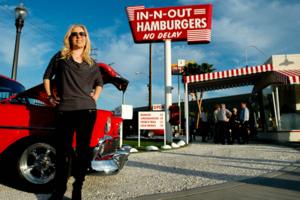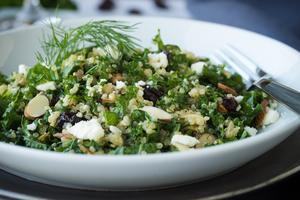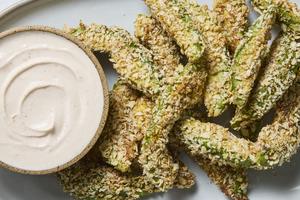Recipes
/Home & Leisure

In-N-Out Burger's leader shares how the chain improves its ingredients
This month In-N-Out Burger became the center of the discussion of synthetic additives in foods when news broke that the Southern California fast food chain had stopped using artificial colorings in its Signature Pink Lemonade and Strawberry Shakes and is in the process of replacing its current ketchup made with high fructose corn syrup to one ...Read more

EatingWell: This yummy side dish tastes just like Mexican street corn
This zesty pasta salad draws inspiration from the flavors of elote — a Mexican recipe with grilled corn on the cob that's smothered in a creamy mayo-based sauce and sprinkled with chili powder, cotija cheese and lime.
Elote-Inspired Pasta Salad
Serves 6
Active Time: 20 minutes
Total Time: 30 minutes
6 ounces small whole-wheat pasta such ...Read more

Environmental Nutrition: Nutrient-dense foods to add to your diet
Eating a variety of foods fuels your body with nutrients important for health. Nutrient-dense foods can help by providing a high amount per calorie of vitamins, minerals, and other health- protective compounds. By contrast, highly processed “junk” or “empty calorie” foods provide a lot of calories without much nutritional value that may ...Read more

Seriously Simple: A perfect picnic salad
As the author of “The Cuisine of California” and “The California Cook,” I researched the history of what we know as Chinese chicken salad. It turns out the first sighting of this now-American classic was whipped up at the famous Santa Monica, California, restaurant Madame Wu’s.
Legend has it Cary Grant, the beloved movie star, ...Read more

Fresh herbs add lightness to meatballs, signaling warmer days ahead
Every May, delicate sprigs of fresh mint and skinny chives push their way up to the garden by my kitchen door. Inspired to use them before they get overgrown, I add them to salads, scrambled eggs and fresh salsa.
Cilantro grown in Midwestern gardens also tastes sweetest when young. My pots of assorted basils won’t be ready for weeks; ...Read more

The Kitchn: I crave these totally surprising ‘fries’ every single week
There is absolutely nothing in my mind that compares to a perfectly ripe avocado. Well, that was until I tried avocado fries. I’d be lying if I didn’t tell you that I was a wee bit skeptical...Read more

The Kitchn: My cooking trick for crispier, better fried rice
Every family makes their own unique version of fried rice, a classic Chinese dish. When I was growing up, my parents always made fried rice the day after we had a big dinner. Leftovers like homeandleisure/recipes/varietymenu/s-3713547">Read more

Colorado whiskey named 'America's greatest' at international spirits competition
A Colorado whiskey was crowned America’s best at an international spirits competition, beating out hundreds of other liquors for the title.
Talnua Distillery in Arvada was awarded the top whiskey accolade from the American Distilling Institute’s 2025 International Spirits Competition, which announced its winners on Wednesday. Its Bourbon ...Read more

EatingWell: A creamy chopped salad rounds out your summer spread
A mix of cool, crunchy vegetables gives this healthy salad a satisfying bite for a perfect side dish. It’s a great accompaniment to your weekend barbecue menu.
Creamy Cucumber, Radish & Tomato Chopped Salad
Serves 6
Active Time: 15 minutes
Total Time: 15 minutes
1/2 cup mayonnaise
1/2 cup crumbled feta cheese
1 tablespoon chopped fresh ...Read more

Environmental Nutrition: Debunking dietary deceptions: Do carbs actually make you fat?
There are a lot of claims about why we should avoid carbohydrates, including the claim that carbs make us “fat.” But is that actually true? A closer look at nutrition suggests that the devil is in the details.
Added sugars, high-fructose corn syrup, and white flour are processed forms of carbohydrates. Carbohydrate-rich foods also include ...Read more

Seriously Simple: A twist on classic oatmeal cookies
I’ve never been much of a cookie maker, but when my friend Nina said, “Diane, you have to try these cookies,” I said, “OK!” I have mastered my chocolate chip cookie recipe, which results in a crispy and not too sweet cookie, so I thought why not try these oatmeal cookies, studded with finely chopped medjool dates and chopped pecans.
I...Read more

It’s grilling season! Time for pork chops
No matter the Memorial Day weather, the grill makes an appearance. The menu shifts as the clouds roll in — quick-cooking, fully-cooked brats when downpours happen, perfectly moist, bone-in pork chops in the sunshine.
Today’s lean pork may be good for our waistlines, but tricky for grillers. The challenge is to reap the ...Read more

The Kitchn: This ‘so delicious’ chicken soup will instantly transport you to Mexico
The Yucatán Peninsula is a magical region in Southeast Mexico that’s rich in Mayan history and surrounded by beautiful waterfronts and jungles. In the towns, you will find colonial haciendas that are often lined with citrus trees and a very particular one called lima agria. From the outside, it resembles a large lime, though when you try it, ...Read more

The Kitchn: The French breakfast bake my family begs me to make
It doesn’t matter if it’s a special occasion or I’m just having friends over — I love a good brunch recipe that feels very fancy, tastes delicious, and is also incredibly easy to make. Enter: my French croissant breakfast bake. It checks all these boxes and ...Read more

Neman: Cheese on the road, chocolate chips and a coincidence for the ages
It’s always funny when a truck overturns and spills 40,000 pounds of cheese onto the road, until you’re the one stuck in traffic behind it.
The problem was that I did not know I was stuck behind a truck that had spilled 40,000 pounds of cheese onto the road. All I knew was that I was in Cincinnati trying to pick up my hungry mother for ...Read more

Gretchen's table: Ham, cheese and chive muffins are an easy breakfast or snack
I'm usually a Southern biscuit kind of girl, especially when they're made with buttermilk. But I would never say no to a really good muffin — be it savory or sweet — since they're the perfect grab-and-go bite when you're in a hurry.
They're easy to eat out of hand, can be made in large quantities and most don't require a lot of technical ...Read more

Grandma's Kitchen classes share and pass on family recipes and culinary tips
PITTSBURGH — The best recipes — or at least the ones that make us feel all warm and cozy inside — are often the ones we grew up with.
There's something special about dishes that have been handed down from grandparent to parent to child and made time and again. And if each succeeding generation of cooks tweaks the instructions or modifies ...Read more

With these tips, your homemade hummus will be the best
You only need to stroll past the hummus section of the grocery store to realize it’s a lot bigger than it used be. The fact that there is even a hummus section, with many, many varieties, tells us how popular this bean dip has become over the past few years.
Of course, hummus has been around for centuries, originating in the Middle East, but ...Read more

Federal cuts gut food banks as they face record demand
Food bank shortages caused by high demand and cuts to federal aid programs have some residents of a small community that straddles Idaho and Nevada growing their own food to get by.
For those living in Duck Valley, a reservation of about 1,000 people that is home to the Shoshone-Paiute Tribes, there’s just one grocery store where prices are ...Read more

EatingWell: This stir-fry is all about the sauce
Apricot jam adds just the right amount of sweetness to balance the spicy, salty and umami flavors in this sauce that lightly coats tender pieces of pork and crisp green beans. If gluten is not a concern, soy sauce may be used instead of tamari.
Pork & Green Bean Stir-Fry
Serves 4
Active Time: 20 minutes
Total Time: 20 minutes
1/4 cup ...Read more








